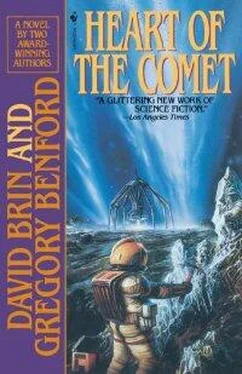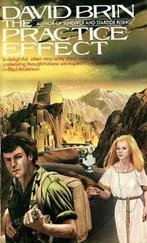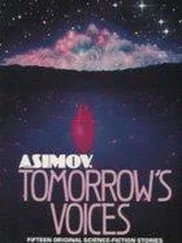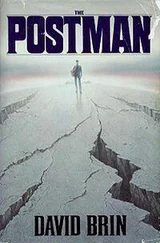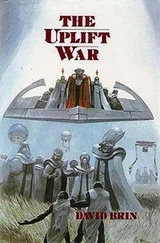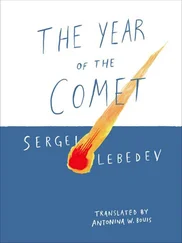Saul nodded. “After the Levites and Salawites assassinated enough opposing legislators to get a majority.”
The African’s voice was low, as if he dreaded this topic but was drawn to it like a moth toward a flame. “The world was tired of centuries of strife in a region that had never known peace.”
“And is it better now.” The High Priest in Jerusalem reigns over a balkanized realm, with sect sniping at sect as never before.
“And did it help the planet? From the Nile to the Euphrates, Israel-Inshallah had planted more trees than existed before in all of Africa north of the equator. Last I heard, a third of the forests were gone—chopped down to make barricades.”
Ould-Harrad’s skin deepened darker than its already rich shade. Saul thought about pulling back. He has already been punished.
Yes, but enough?
“Dr. Lintz, I…”
“Yes?”
Ould-Harrad shook his head. “I had nothing to do with the attempt to blow up the Great Temple. It’s true, I had friends in the Conspiracy—and in penance for that association I am on this I’ll-stared cruise—but I never wanted to bring harm to the holiest shrine of three faiths. I assure you, I would rather have torn out my…”
“Oh, you poor bastard,” Saul interrupted, half-pitying the fellow and laughing to crush his own painful memories. “For ten years you’ve heard but not listened, been punished but never understood. When, oh when will people like you ever come to understand that real Jews never wanted that blasted temple built in the first place?”
Ould-Harrad’s gas sensor hung from one hand, forgotten. He stared. “A few kibbutzim, some secular humanists fought it, I know. But—”
“But nothing!” Saul leaned forward. “The vast majority of Jews, in Israel and abroad, voted against it, argued against it, fought it every step of the way. It was compelled on us, by murderous fanatics and by an ignorant world all too eager for peace.”
Saul almost spat the word. “Peace! It wasn’t enough to destroy my nation and my family, Colonel Ould-Harrad. They installed priests that actually had the effrontery to tell me how to be a Jew! Even Hitler did not try to do that!”
In the faint, centrifugal tug of the gravity wheel, Ould-Harrad seemed to lose the strength to stand. He sagged into a web-chair.
“But the leader of the New Sanhedrin is of your Cohen priestly clan! And the Lead Temple Attendant is a Levite… The Pope’s Legate, the other Christians and Muslims, must take second place to the oldest faith’s precedence!”
Ould-Harrad shook his head. “My comrades objected to that humiliation—and to the removal of the beautiful mosque that stood where the temple was to go—but I don’t understand what the Jews had to complain of. Was not two millennia of prophecy being fulfilled at last?”
Saul did not answer immediately. He looked across the room, where the picture wall depicted the onion domes of old Kiev. Sunset flared brilliant tints across the steppes beyond the city walls. New gilt crosses once again topped the tower peaks, signifying Great Russia’s return to its mystical past.
Ten years, he thought. And still it seems impossible to make anyone understand.
Perhaps he owed it to the man, out of charity, to try. But how could one explain that Judaism had changed over two thousand years of exile, since the Romans burned the Temple of the Maccabees to the ground, slew the priests and scattered the people to the winds?
The remnants had wandered to strange climes, adopted alien ideas. Gradually, Hebrew farmers who pioneered the Polish and Russian plains were crowded by later peoples into cramped cities to become an urban folk. The priestly family lines—the Cohens and Levites—lost their influence. For how could they perform their rituals with no central site from which to make sacrifices to appease a terrible godhead?
Spiritual leadership fell upon the rabbi —the teacher—a role one did not inherit, but earned through learning and wisdom.
A role described in detail by Jesus, if the truth be told. Only he, too, had those who prophesied in his name. He , too, was fol lowed by priests.
After a hundred years of strife and accomplishment, the alliance led by Israel had finally begun fraying during Saul’s youth. The Hell Century took its toll even in the belt that folk called “The Green Land.” Prophets appeared on street corners, and cults proliferated.
Islam, too, had suffered a hundred schisms, and Christianity was battered, divided.
Then someone had a bright idea… an obvious solution. And, like so many obvious solutions, it was disastrously wrong.
The Diaspora changed us, Saul thought. In exile, we became individualists, a people of books, and not of sacrifices on golden altars. We mourned the Temple. But wasn’t its burning a sign that it was time to know God in other ways?
How would Ould-Harrad ever understand that no modern Jew wanted anybody to intercede for him? Everyone had to come to his car her own understanding with God.
Ould-Harrad looked down at his hands. “When the conspirators blew up the Al Aqsa Mosque in protest, it was intended that the Levites take the blame, not the kibbutzim. The plan… they never wanted a bloodbath…”
He seemed unable to continue. Saul realized that the man was haunted by guilt and also, perhaps, by a dread that he might not ever even understand the role he had played.
Saul blinked away a memory of smoke over the Judean hills. He shook his head, knowing that there was no way he could help this man.
“I’m sorry,” he began softly. Then he cleared his throat. “Is that all, Colonel? If you’re finished, I have some important experiments under way.”
The black spacer looked up and nodded curtly. “I will report the situation under control.”
Saul had already turned back to his microscope when he heard the door hiss behind him. He tried to return to the business that had been interrupted, first by Joao Quiverian’s persistent questioning, and then by the dolorous Ould-Harrad, but his hands seemed locked over the controls.
“Room environment, dim lights by half,” he commanded aloud and the laboratory darkened in response.
Work, he knew, was a way to take himself away from the memories. “Sample AR 71B dash 78 S, on screen twelve,” he said to the ever listening, semi sentient lab computer. “Let’s see if those inclusions look as suspicious now as I thought they did before Joao stank up the place.”
The last part was not for the computer. And although he hunched over the holistank to immerse himself in mysteries, Saul found that he did not really mind at all the faint scent of ice and almonds in the air.
She tapped tentatively. Then, when no muffled answer came, a harder rap. This brought forth a faint, querulous grunt. When the panel finally hissed open, Virginia stepped through and stood barely inside, feeling the door suck shut behind her.
She said diffidently, “You had sample breakage?”
It seemed a good opening. The danger—if any—was well past before she had heard. Saul had already left the planetology department, where the sample broke, and come down here to his own bio lab. But the ripple of concern among the crew had made her at last muster the courage to seize a pretext.
“Ummm?” Saul was studying his screens, making tiny notes in a small ledger with an old-fashioned pencil. She wondered at this eccentricity; the expedition used standard electronic markers and memory pads. He must have brought a packet of notebooks in his own small, personal weight allotment. She had heard of bringing vintage cabernet and caviar, but not pencils, for heaven’s sake.
Читать дальше
